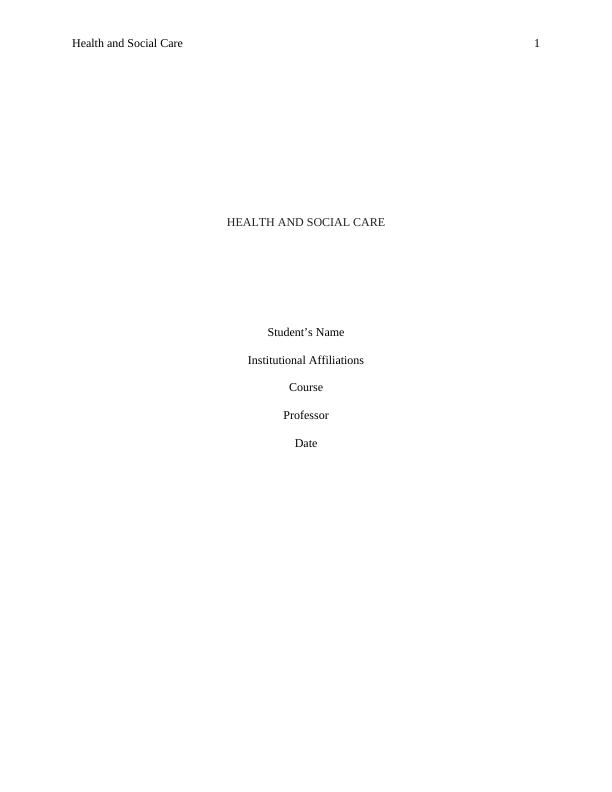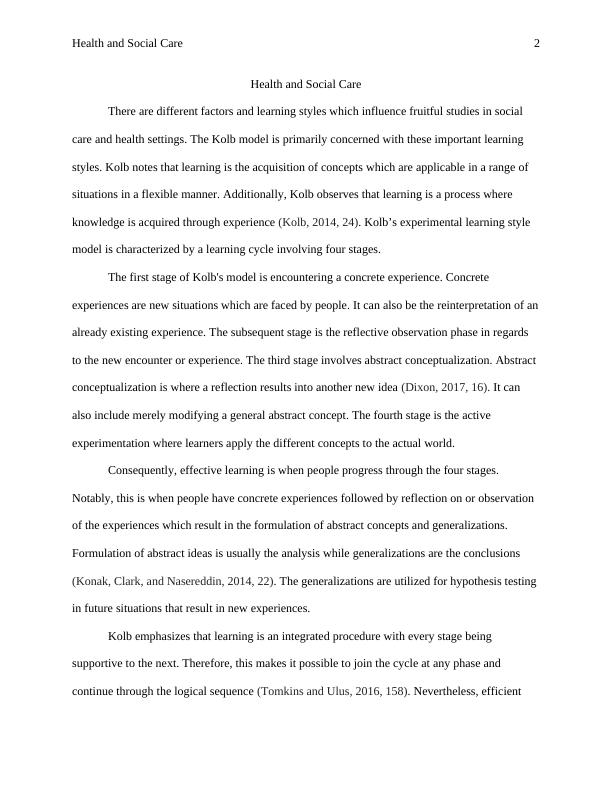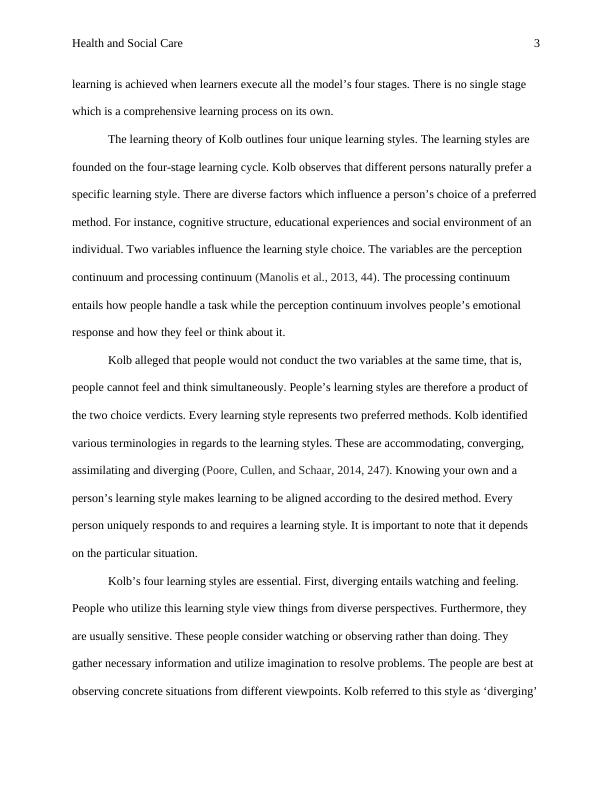Learning Styles and Communication Theories in Health and Social Care
Added on 2023-06-10
9 Pages2335 Words179 Views
Health and Social Care 1
HEALTH AND SOCIAL CARE
Student’s Name
Institutional Affiliations
Course
Professor
Date
HEALTH AND SOCIAL CARE
Student’s Name
Institutional Affiliations
Course
Professor
Date

Health and Social Care 2
Health and Social Care
There are different factors and learning styles which influence fruitful studies in social
care and health settings. The Kolb model is primarily concerned with these important learning
styles. Kolb notes that learning is the acquisition of concepts which are applicable in a range of
situations in a flexible manner. Additionally, Kolb observes that learning is a process where
knowledge is acquired through experience (Kolb, 2014, 24). Kolb’s experimental learning style
model is characterized by a learning cycle involving four stages.
The first stage of Kolb's model is encountering a concrete experience. Concrete
experiences are new situations which are faced by people. It can also be the reinterpretation of an
already existing experience. The subsequent stage is the reflective observation phase in regards
to the new encounter or experience. The third stage involves abstract conceptualization. Abstract
conceptualization is where a reflection results into another new idea (Dixon, 2017, 16). It can
also include merely modifying a general abstract concept. The fourth stage is the active
experimentation where learners apply the different concepts to the actual world.
Consequently, effective learning is when people progress through the four stages.
Notably, this is when people have concrete experiences followed by reflection on or observation
of the experiences which result in the formulation of abstract concepts and generalizations.
Formulation of abstract ideas is usually the analysis while generalizations are the conclusions
(Konak, Clark, and Nasereddin, 2014, 22). The generalizations are utilized for hypothesis testing
in future situations that result in new experiences.
Kolb emphasizes that learning is an integrated procedure with every stage being
supportive to the next. Therefore, this makes it possible to join the cycle at any phase and
continue through the logical sequence (Tomkins and Ulus, 2016, 158). Nevertheless, efficient
Health and Social Care
There are different factors and learning styles which influence fruitful studies in social
care and health settings. The Kolb model is primarily concerned with these important learning
styles. Kolb notes that learning is the acquisition of concepts which are applicable in a range of
situations in a flexible manner. Additionally, Kolb observes that learning is a process where
knowledge is acquired through experience (Kolb, 2014, 24). Kolb’s experimental learning style
model is characterized by a learning cycle involving four stages.
The first stage of Kolb's model is encountering a concrete experience. Concrete
experiences are new situations which are faced by people. It can also be the reinterpretation of an
already existing experience. The subsequent stage is the reflective observation phase in regards
to the new encounter or experience. The third stage involves abstract conceptualization. Abstract
conceptualization is where a reflection results into another new idea (Dixon, 2017, 16). It can
also include merely modifying a general abstract concept. The fourth stage is the active
experimentation where learners apply the different concepts to the actual world.
Consequently, effective learning is when people progress through the four stages.
Notably, this is when people have concrete experiences followed by reflection on or observation
of the experiences which result in the formulation of abstract concepts and generalizations.
Formulation of abstract ideas is usually the analysis while generalizations are the conclusions
(Konak, Clark, and Nasereddin, 2014, 22). The generalizations are utilized for hypothesis testing
in future situations that result in new experiences.
Kolb emphasizes that learning is an integrated procedure with every stage being
supportive to the next. Therefore, this makes it possible to join the cycle at any phase and
continue through the logical sequence (Tomkins and Ulus, 2016, 158). Nevertheless, efficient

Health and Social Care 3
learning is achieved when learners execute all the model’s four stages. There is no single stage
which is a comprehensive learning process on its own.
The learning theory of Kolb outlines four unique learning styles. The learning styles are
founded on the four-stage learning cycle. Kolb observes that different persons naturally prefer a
specific learning style. There are diverse factors which influence a person’s choice of a preferred
method. For instance, cognitive structure, educational experiences and social environment of an
individual. Two variables influence the learning style choice. The variables are the perception
continuum and processing continuum (Manolis et al., 2013, 44). The processing continuum
entails how people handle a task while the perception continuum involves people’s emotional
response and how they feel or think about it.
Kolb alleged that people would not conduct the two variables at the same time, that is,
people cannot feel and think simultaneously. People’s learning styles are therefore a product of
the two choice verdicts. Every learning style represents two preferred methods. Kolb identified
various terminologies in regards to the learning styles. These are accommodating, converging,
assimilating and diverging (Poore, Cullen, and Schaar, 2014, 247). Knowing your own and a
person’s learning style makes learning to be aligned according to the desired method. Every
person uniquely responds to and requires a learning style. It is important to note that it depends
on the particular situation.
Kolb’s four learning styles are essential. First, diverging entails watching and feeling.
People who utilize this learning style view things from diverse perspectives. Furthermore, they
are usually sensitive. These people consider watching or observing rather than doing. They
gather necessary information and utilize imagination to resolve problems. The people are best at
observing concrete situations from different viewpoints. Kolb referred to this style as ‘diverging’
learning is achieved when learners execute all the model’s four stages. There is no single stage
which is a comprehensive learning process on its own.
The learning theory of Kolb outlines four unique learning styles. The learning styles are
founded on the four-stage learning cycle. Kolb observes that different persons naturally prefer a
specific learning style. There are diverse factors which influence a person’s choice of a preferred
method. For instance, cognitive structure, educational experiences and social environment of an
individual. Two variables influence the learning style choice. The variables are the perception
continuum and processing continuum (Manolis et al., 2013, 44). The processing continuum
entails how people handle a task while the perception continuum involves people’s emotional
response and how they feel or think about it.
Kolb alleged that people would not conduct the two variables at the same time, that is,
people cannot feel and think simultaneously. People’s learning styles are therefore a product of
the two choice verdicts. Every learning style represents two preferred methods. Kolb identified
various terminologies in regards to the learning styles. These are accommodating, converging,
assimilating and diverging (Poore, Cullen, and Schaar, 2014, 247). Knowing your own and a
person’s learning style makes learning to be aligned according to the desired method. Every
person uniquely responds to and requires a learning style. It is important to note that it depends
on the particular situation.
Kolb’s four learning styles are essential. First, diverging entails watching and feeling.
People who utilize this learning style view things from diverse perspectives. Furthermore, they
are usually sensitive. These people consider watching or observing rather than doing. They
gather necessary information and utilize imagination to resolve problems. The people are best at
observing concrete situations from different viewpoints. Kolb referred to this style as ‘diverging’

End of preview
Want to access all the pages? Upload your documents or become a member.
Related Documents
Learning styles investigation and report Assignmentlg...
|9
|2242
|101
Applied Counseling Theory 2022lg...
|9
|1378
|21
Analyzing Models of Learning Preferenceslg...
|7
|1679
|44
Understand Learning Process Assignmentlg...
|8
|1920
|50
Kolb Learning Cycle: Assignmentlg...
|4
|742
|77
Models or theories of reflection and their role in developing reflective practicelg...
|11
|3544
|24
